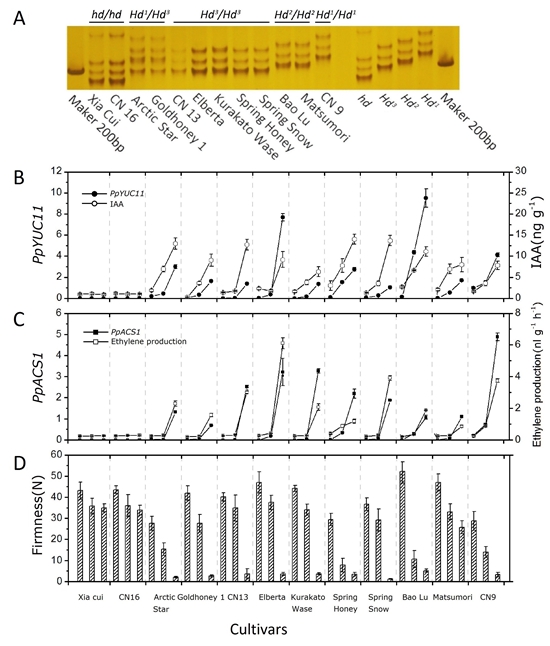分享到
New Research Progress on Genetic Mechanism of Stony Hard Phenotype in Peach
Prompt post-harvest softening of fruits is one of the major bottleneck constraints of peach industry development. Therefore, the study of fruit maturation and softening mechanism of peach is of great significance for breeding peach cultivars with better preservability. Peach cultivars can be classified into three groups: melting (M), non-melting (NM) and stony hard (SH) flesh types. A high level of ethylene production (in the late ripening phase) characterizes the M and NM varieties. This phase, however, is absent in the SH phenotype, which is thought to contribute to the inhibition of fruit softening in stony hard peaches. Recently, the peach breeding team led by Professor Wang Zhiqiang from Zhengzhou Fruit Research Institute of CAAS has made progress on genetic mechanism of stony hard phenotype in peach.


In this study, they firstly employed digital gene expression technologies to study the regulation of IAA accumulation during the late ripening stages between melting and stony hard peach, and identified 34 auxin-homeostasis-related genes differentially expressed transcripts. A YUC gene (ppa008176m) showed an identical expression pattern to PpACS1 for both cultivars among them. Remarkably, the presence of a (TC)20 microsatellite (an allele named hd) appears to be associated with stony hard cultivars when present in a homozygous state, whereas normal-fleshed (M or NM) cultivars possess at least one other allele (Hd1, Hd2 or Hd3) at the PpYUC11 locus. There is a strong coordinated variation between PpYUC11 expression, IAA concentration, PpACS1 expression, ethylene production and fruit firmness in mesocarp of fruits during ripening transition stage in number of peach cultivars with different genotype in the PpYUC11 SSR loci. The study indicates that the flavin monooxygenase gene PpYUC11 is the strong candidate gene for the stony hard phenotype in peach.
This work was supported by The Agricultural Science and Technology Innovation Program (ASTIP) [CAAS-ASTIP-2015-ZFRI], National Natural Science Foundation of China [No. 31501732], the National Key Technology Support Program of China [2013BAD02B03-2; 2014BAD16B04], and the National Basic Research Program of China [863 program; No. 2011AA10020606].
This work has been published online on Journal of Experimental Botany on August 24, 2015(doi:10.1093/jxb/erv400). More details are available on the link bellow: http://jxb.oxfordjournals.org/content/early/2015/08/23/jxb.erv400.full
This work was supported by The Agricultural Science and Technology Innovation Program (ASTIP) [CAAS-ASTIP-2015-ZFRI], National Natural Science Foundation of China [No. 31501732], the National Key Technology Support Program of China [2013BAD02B03-2; 2014BAD16B04], and the National Basic Research Program of China [863 program; No. 2011AA10020606].
This work has been published online on Journal of Experimental Botany on August 24, 2015(doi:10.1093/jxb/erv400). More details are available on the link bellow: http://jxb.oxfordjournals.org/content/early/2015/08/23/jxb.erv400.full
Latest News
-
 Apr 18, 2024Opening Ceremony of the Training Workshop on Wheat Head Scab Resistance Breeding and Pest Control in Africa Held in CAAS
Apr 18, 2024Opening Ceremony of the Training Workshop on Wheat Head Scab Resistance Breeding and Pest Control in Africa Held in CAAS -
 Apr 03, 2024IPPCAAS Co-organized the Training Workshop on Management and Application of Biopesticides in Nepal
Apr 03, 2024IPPCAAS Co-organized the Training Workshop on Management and Application of Biopesticides in Nepal -
 Mar 28, 2024Delegation from the School of Agriculture and Food Science of University College Dublin, Ireland Visit to IAS, CAAS
Mar 28, 2024Delegation from the School of Agriculture and Food Science of University College Dublin, Ireland Visit to IAS, CAAS -
 Mar 25, 2024Director of World Food Prize Foundation visited GSCAAS
Mar 25, 2024Director of World Food Prize Foundation visited GSCAAS -
 Mar 20, 2024Institute of Crop Sciences (ICS) and Syngenta Group Global Seeds Advance Collaborative Research in the Seed Industry
Mar 20, 2024Institute of Crop Sciences (ICS) and Syngenta Group Global Seeds Advance Collaborative Research in the Seed Industry
